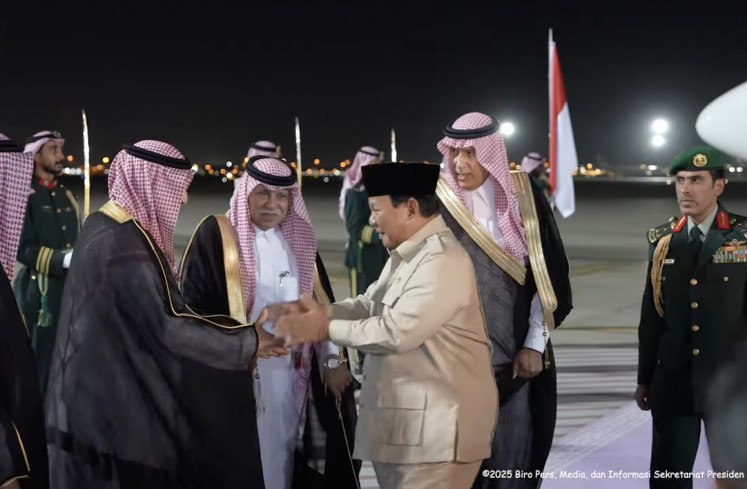Popular Reads
Top Results
Can't find what you're looking for?
View all search resultsPopular Reads
Top Results
Can't find what you're looking for?
View all search resultsBiodiversity, Indonesia and poverty
The 10th Conference of Parties (COP) of the Convention on Biological Diversity (CBD) was held in Nagoya, Japan, from Oct
Change text size
Gift Premium Articles
to Anyone

T
he 10th Conference of Parties (COP) of the Convention on Biological Diversity (CBD) was held in Nagoya, Japan, from Oct. 18 to 29.
Since the CBD was introduced in 1993, this convention is aimed at mainstreaming biodiversity conservation initiatives and sustainable use of biodiversity on a global scale.
The CBD also intends to promote fair and equitable benefit-sharing of biological utilization, including genetic resources.
As a “mega-biodiversity” nation, Indonesia could become a key player in efforts to save global species. Indonesia could play a leading role in developing international policies that support conservation of tropical biological resources. Indonesia could also capitalize on expansion of international research collaborations to study biology and utilize natural products.
This strategic position, if well-played, may result in gigantic benefits for Indonesia. Remember, a large proportion of the plant and animal species that inhabit the Earth live in this tropical country.
Successful conservation of biodiversity in Indonesia would make a significant contribution to combating the extinction of precious global species.
The richness of forest habitats and coral reef ecosystems in the tropics provides the world with incalculable biological capital.
Unfortunately, most of this biological wealth has not been sufficiently studied, and as a result, there remains insufficient knowledge of their economic value.
In addition to being an important part of the ecosystem, species diversity may serve as a source of income. The exploration, identification and utilization of biodiversity can lead to commercial benefits — presently referred to as “bio-prospecting”.
However, an inconvenient factor remains. Many commercial products, including medicines, are derived from traditional knowledge of tropical biodiversity, but are developed and commercially traded by giant companies based in developed countries.
Ironically, there are no benefits for the people who traditionally have been developing and utilizing the same products.
The great loss to countries that are naturally home to biological wealth has become one of the focuses of the current COP. The ability to utilize species diversity for Indonesian interests must be improved. But at the same time, we are actually in a dilemmatic position.
We contribute to the loss of tropical species. Inability to slow the rate of deforestation and prevent loss of coral reef habitats has been seen as the main cause of extinction of tropical species. With no real action, our diplomacy on biodiversity conservation will not be well-received in international forums.
The target to save biodiversity in Indonesia could be synergized with other programs. The negotiation on climate change mitigation, which includes preventing deforestation as an important part of the overall strategy, may become a good tool for saving tropical forest biodiversity. Therefore, Indonesia’s perspectives on REDD (reducing emission from deforestation and degradation) initiatives should be changed.
This scheme should not be only perceived as a carbon trading mechanism that aims to reduce carbon emissions, but it has to include biodiversity protection as an integral component.
Indonesia is also actively involved in achieving the United Nations Millennium Development Goals (MDGs). In terms of environmental sustainability, the objective of Indonesia’s MDGs is to synchronize state policies with sustainable development. Decreasing the rate of deforestation has been put in priority position. If this objective is achieved, it could notably contribute to the conservation of species diversity.
Indonesia frequently reacts negatively to international criticisms of the loss of tropical ecosystems.
This is understandable because we need development in order to alleviate poverty. As a consequence, tropical ecosystems have been converted. This is actually the challenge of millennium development: Reducing poverty on the one hand goals: while saving the environment on the other.
This involves two interesting factors. First, we believe that the exploitation of biological resources will have significant effects on efforts to fight poverty. But in fact, the massive exploitation of natural diversity has not significantly minimized Indonesia’s poverty rate.
The history of natural forest exploitation is a fine example. Before the golden era of natural forest concessions ended, its contribution to the improvement of the lives of people living around forests was not very real. On the contrary, massive exploitation created disasters. The recent flood in Wasior that killed hundreds of people was partly caused by deforestation.
The second factor is that the traditional methods of utilizing biodiversity also fail to uplift living standards. The living conditions of indigenous people in forest areas has become worse as these people become more marginalized. This is not only because of external factors, such as plantation expansion and forest exploitation, but also the increasing population.
For example, reports recently found that more people from Anak Dalam tribe in Jambi are leaving the forests. Ironically, most of them then become beggars in the city.
In short, we have to think of a regime of utilization of biological resources that is sustainable and contributes to poverty alleviation. One approach is to increase bio-prospecting activities. Scientific exploration and research has to be prioritized.
Local knowledge of biodiversity also must be accommodated. Development of biodiversity prospects will not only improve our awareness of the importance of biological resources, it will produce financial benefits as well.
The writer is an ecologist at the University of Bengkulu.









